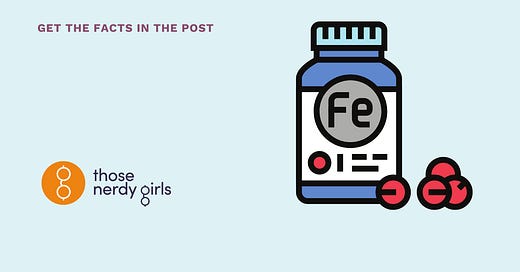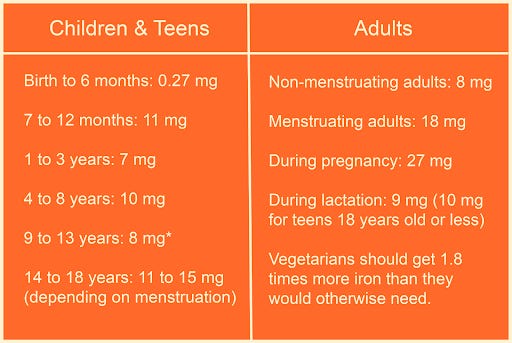Should I take an iron supplement?
It very much depends. For example, people who menstruate or have vegetarian diets are more likely to benefit from extra iron.
Those Nerdy Girls deeply appreciates all of our Substack subscribers. We are especially grateful to our paid subscribers who support the sustainability of our work.
As a thank you for your generous support, all new annual subscribers between now and October 14th will receive a 20% discount for the first year.
Please consider supporting us with your paid subscription. It means so much to us to have you as a valued community member!
Should I take an iron supplement?
It very much depends. For example, people who menstruate or have vegetarian diets are more likely to benefit from extra iron. The best way to know if you need more iron is by having an iron blood test and talking to your clinician.
Iron is a mighty mineral. It’s not only a building block of hemoglobin — a protein inside red blood cells that carries oxygen throughout the body — iron is essential for energy, immune function, and hormone production. So it’s not surprising our bodies are pretty good at holding onto iron. Only a tiny fraction of the body’s iron stores need to be replaced each day by foods.
The human body contains between 3,000 mg and 4,000 mg of iron. However, the average adult only loses 1 mg of iron daily (or 2 mg if they’re menstruating). Still, iron deficiency can happen over time if you aren’t getting enough iron to replace your losses. If the imbalance isn’t corrected, anemia will eventually result when your iron stores get so low that your body doesn’t have enough available iron to make hemoglobin.
Most people who have access to a variety of nutrient-dense foods get enough iron from their diet to avoid deficiency. But that’s not true for everyone. Some people need extra iron.
You may benefit from taking an oral iron supplement if:
✅ You might not be getting enough iron to meet your needs
✅ You have anemia caused by low iron (iron deficiency anemia)
✅ You have low iron without anemia (iron deficiency)
Keep in mind, getting more iron than you need has no benefit and can even be harmful.
Below, we’ll look more closely at why you might need an oral iron supplement.
➡️ How do I know if I’m getting enough iron?
Getting your blood checked is the best way to know whether you’re getting enough iron. But even if your numbers are in the normal ranges, extra iron might help prevent low iron if you’re likely to have a nutritional gap based on your intake or needs. For example, the American College of Obstetrics and Gynecology recommends taking a daily prenatal vitamin that contains iron before and during pregnancy to prevent iron deficiency.
To know whether you’re getting enough iron it helps to understand how much iron you need. Different people need different amounts of iron.
Below are the Recommended Daily Amounts (RDA) of elemental iron based on age and other factors:
* Ask your child’s clinician about additional iron needs if menstruating.
You may be wondering why the RDAs for iron are more than the 1 or 2 milligrams an average adult loses daily. That’s because iron is poorly absorbed from the gut. On top of that, many factors can affect how well iron is absorbed, including food sources.
The best food sources of iron are meat and seafood. They contain a better-absorbed form of iron called “heme” iron. Foods from plant sources can be good sources too, but they only contain a harder-to-absorb “nonheme” form of iron. Examples of foods with nonheme iron include beans, dried fruits, fortified grains, tofu, and leafy greens. If your diet only contains plant-based sources of iron, then you need to get more of it since less is absorbed.
Some people have difficulty getting enough iron from their diet, even if they’re getting plenty of iron-rich foods. This can happen for many reasons. Some common examples are listed below.
✅ Increased iron needs
Pregnancy
Childhood
✅ Blood loss of any kind
Menstruation (especially if periods are heavy, long-lasting, or frequent)
Gastrointestinal (GI) bleeding
✅ Lower absorption of iron
Gastrointestinal (GI) inflammatory conditions
Previous gastric bypass surgery
➡️ How do I know if I’m iron deficient or have iron-deficiency anemia?
Many people with mild anemia don’t notice symptoms. Instead, they find out they’re anemic when they have a routine blood test that checks their blood cell counts. A low hemoglobin level is commonly used to identify anemia.
Anemia can make you feel crummy. It might make it harder for you to keep up day-to-day. In children, anemia can interfere with learning and development. During pregnancy, anemia can make complications more likely. And for anyone, anemia can worsen many health conditions if left untreated — and even lead to heart problems.
Possible iron-deficiency anemia signs and symptoms include:
✅ Fatigue or weakness
✅ Dizziness
✅ Feeling out of breath
✅ Headache
✅ Trouble focusing
✅ Hair loss or brittle fingernails
✅ Racing heart
✅ Cold hands or feet
✅ ”Whooshing” sound
✅ Restless leg syndrome
✅ Craving for non-food items, like ice chips
✅ Less color in the linings of the mouth or eyes
Close to 2 billion people worldwide are estimated to have anemia. Women under 50 are most likely to have anemia. Cancer, autoimmune disorders, and chronic kidney disease can also make people more likely to develop anemia.
In the United States, anemia rates are higher for women who are Black, Hispanic, or living in homes with incomes below the poverty level. Less access to iron-rich foods and healthcare helps explain these differences and shows why iron deficiency is a measure of health equity. Contributing writer MacKenzie Isaac, a doctoral student in population health, will discuss the relationship between iron deficiency and health equity in-depth in an upcoming TNG post.
If you’re diagnosed with anemia, your iron levels should be checked. Iron deficiency is the most common cause of anemia — but it’s not the only one. It's important to know what’s causing your anemia so the underlying cause(s) can be treated. For example, if your anemia is caused by a low level of vitamin B12, then you need extra B12.
Blood tests can measure how much iron you have in your body. The most common way is by measuring ferritin (an iron-storage protein). Most ferritin is stored in your liver, spleen, and bone marrow, but the small amount of ferritin in the blood is often a good measure of your overall iron stores.
The National Institutes of Health recommends ferritin levels at or above 20 ng/mL for women and 40 ng/mL for men. Other experts say it’s best to maintain ferritin levels above 50 ng/mL — for both sexes. Even higher levels are recommended for people with chronic conditions such as heart failure or chronic kidney disease. Your clinician can help you figure out a ferritin level that’s optimal for you.
It’s also important to have their help interpreting your ferritin level. If your ferritin is low, then you know you’re iron deficient. But if you have chronic inflammation, you could have a ferritin level that’s normal (or high) even when you’re iron deficient. Other tests can help in this situation. For example, a low transferrin saturation (TSAT) can help show an iron deficiency. Your clinician might also check C-reactive protein in your blood to measure inflammation.
Iron stores are usually checked if you have anemia. But there are benefits to checking iron levels even if your blood counts are normal. If iron deficiency is found earlier, it can be treated before anemia happens. What’s more, replenishing your iron stores if they’re low might help you feel and function better. Some people with iron deficiency have anemia symptoms even though their hemoglobin is within the normal range.
Eating iron-rich foods can help prevent iron deficiency. But once your iron is low, oral iron supplements are usually recommended. Too often, though, iron deficiency goes unnoticed. To change this, the International Federation of Gynecology and Obstetrics recommends that all people who are menstruating be regularly tested for iron deficiency by measuring ferritin (and TSAT for chronic inflammation).
Maintaining iron balance can help improve quality of life, overall health, and pregnancy outcomes.
➡️ Treating iron deficiency (with or without anemia)
We’ll cover how to choose an oral iron supplement and take it in an upcoming post. For now, just remember that taking an iron supplement is only one step in treating iron deficiency. It’s also essential to:
✅ Know why your iron is low and address the underlying cause(s) if possible.
✅ Have follow-up blood tests to tell whether your iron supplements are working.
✅ Seek other treatment if oral iron isn’t working. Some people need intravenous (IV) iron to treat iron deficiency.
Stay safe. Stay informed. And stay in iron balance.
Further reading:
Iron-Deficiency Anemia (National Heart, Lung, and Blood Institute)
Iron-Deficiency Anemia (American Society of Hematology)
Over Half of Iron Deficiency Cases in Large Health System Still Unresolved at Three Years
ICYMI - Digest of Recent Posts:
Help Advance Science & Get Free At-Home COVID, Flu, and RSV Testing!
The City University of New York Institute for Implementation Science in Population Health (CUNY ISPH) is recruiting participants for an ongoing research study on respiratory infections. To learn more, watch a short video about the study.
If you or someone you know is interested in participating, simply email the study team at recruitprotects@sph.cuny.edu for a personalized link to the study recruitment form. Please put “Interested in CUNY Project PROTECTS - TNG” in the Subject line.
Reminder that we now have an online store filled with amazing nerdy merchandise.
Your purchases will help financially support the science communication mission of Those Nerdy Girls.
P.S. We’d love to see pics of you and your friends and family sporting their new TNG swag. You might even be featured in our shop! Email us your pics at info@dearpandemic.org
Like what you read? Please share it with others!
If you have a question, let us know!
We read every question and use them to inform our upcoming content, though we are unable to respond to each specific question.




